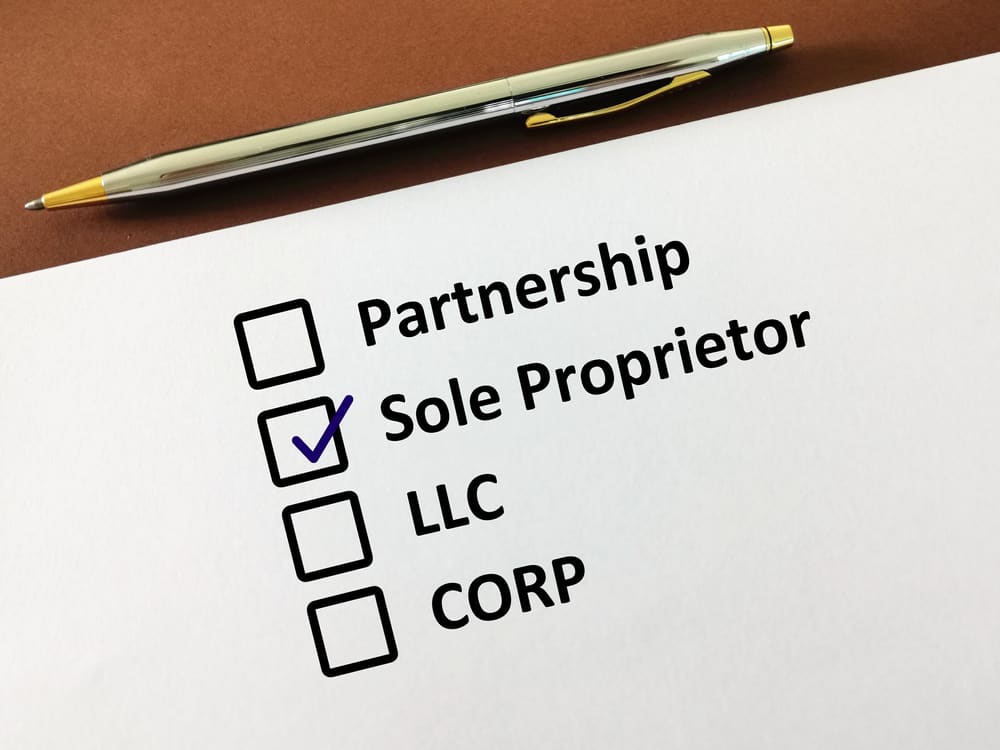Deciding on the right business structure is one of the most crucial decisions you have to make regarding your business. Some entrepreneurs prefer smaller, less complex business structures because they’re easier to form and operate. Others, however, like the prospect of more complex structures because of the benefits they provide.
Regardless of what side you fall on, if you’re debating whether to opt for an LLC or a sole proprietorship, this article is for you. We’ll answer the question of “What is the difference between an LLC and sole proprietorship” by elaborating on some of the most crucial differences between these two structures.
Apart from giving you an overview of their differences, we’ll also individually cover both structures and share their most compelling advantages and disadvantages to help you decide which one would be better suited for your business. At the end of our article, you’ll find a detailed FAQ section where we answer some pressing questions.
Let’s start by defining what an LLC is.
What Is an LLC?

An LLC (Limited Liability Company) is a type of business entity created under state law that protects its members from liability. In other words, the members are not held responsible in case the company faces a claim, a debt, or a lawsuit. Because of this, it provides a lot of flexibility and protection for its owners, which is why it’s the preferred business entity for many. There are various types of LLCs, the most common being single-member LLCs and multi-member LLCs.
Benefits of Forming an LLC
Now that you’re aware of what an LLC is as a business entity, it’s time to examine some of its main benefits apart from liability protection.
Easier to Form Than Corporations
LLCs are, generally speaking, much easier to form and operate than corporations. They have a much simpler structure and management compared to corporations, and LLCs are often a stepping stone for entrepreneurs who want to dip their toes in more complex business structures without forming a corporation right from the get-go.
Flexibility in Terms of Ownership
Another benefit of forming LLCs you should be aware of is that they provide a lot of ownership flexibility. As opposed to other business structures, they have no limits in the number of members an LLC can have, or where the shareholders come from. Having flexibility in ownership allows for more collaboration and freedom when choosing your colleagues, which is always a plus.
No Double Taxation
LLCs also come with amazing tax-related benefits. They qualify for pass-through taxation as opposed to double taxation, so any profits will be taxed only on individual tax returns. In addition, LLC members also qualify for a 20% pass-through deduction.
Less Paperwork

Let’s face it, nobody likes doing paperwork. If the thought of spending hours upon hours doing paperwork turns you off, LLCs might be the ideal business entity for you.
Unlike some other types of business structures, LLCs have relatively less paperwork. All you’re required to do as an LLC owner/member is file articles of organization when you’re establishing your LLC and provide annual reports and taxation. The rest of the paperwork is minimal, making it a big selling point for LLCs.
Disadvantages of Forming an LLC
We looked at some of the main benefits of forming an LLC, but what about some of the drawbacks associated with this entity?
More Expensive to Form
One of the main drawbacks of forming an LLC is that you’ll need a higher budget at the start, since some of the steps required to form an LLC can be quite costly. The formation fees are higher, and, depending on the state in which you’re forming your LLC, the paperwork you have to file with the state can be quite expensive.
Ownership Transfer
The ownership of LLCs is hard to transfer compared to other business entities since LLCs don’t operate with stock.
Now, let’s move on to sole proprietorships.
What Is a Sole Proprietorship?

A sole proprietorship is one of the simplest business structures available in the US – it’s a business entity that has only one owner. Unlike LLCs, sole proprietorships aren’t incorporated and they don’t provide liability protection. This business structure is a great option for those who want to operate a business but they don’t want the hassle of being in charge of a complex business structure.
Sole proprietorships can have the same name as the owner, or they can operate under an official business name.
Benefits of Sole Proprietorships
To provide a balanced review of LLCs vs. sole proprietorships as a whole, it’s important to look over some of the best benefits that come with forming a sole proprietorship.
Sole Proprietorships Are Easy to Form
One benefit sole proprietorships share with LLCs is that they also have an uncomplicated and quick formation process.
Cheap to Form
To add to our previous point, unlike LLCs, sole proprietorships don’t require a high budget to form because there are fewer start-up costs. This is the main reason why many entrepreneurs who are just starting out prefer sole proprietorships over LLCs.
You Are the Boss

Unless you’re forming a single-member LLC, LLCs require consulting with other members and fellow owners before making any kind of decision. Contrary to LLCs, with sole proprietorships, you will be your own boss and you get to make all the decisions regarding profits and how your business will operate.
Nobody likes dealing with conflict and arguments in the workplace, and creating a sole proprietorship is one sure way to prevent that from happening.
You Get to Keep All the Profits
Since you’ll be the only one who is operating your business, you get to keep all the profits your business makes.
Disadvantages of Forming a Sole Proprietorship
Like with any other business structure, there are certain disadvantages that come with forming a sole proprietorship that you should be aware of.
You Are Responsible for All the Decisions
While being your own boss might be a fun prospect, you also have to consider the flip side of that – you’re the one who will be responsible for all the decisions for your business, even the ones that lead to loss of profits. Additionally, being the only one in charge often puts a lot of pressure on owners as there are no partners to consult and get a second opinion from.
No Limited Liability
Last but not least, in case something bad happens to your business, your personal assets will be up for grabs in court since there is no legal distinction between you and your business.
The Main Difference Between an LLC and a Sole Proprietorship
Ultimately, the main difference between an LLC and a sole proprietorship lies in the liability that each business structure is granted.
As a sole proprietor, there is no legal separation between your personal assets and your business assets, or between you and your business, which is one of the main drawbacks of sole proprietorships. This means that the owner will be held accountable for any claim or debt that occurs in the business. Essentially, the sole proprietor will be responsible for all liability, unlike LLC owners who are protected.
Differences in Management Between an LLC and a Sole Proprietorship
Apart from personal liability, there are also significant differences in terms of how LLCs and sole proprietorships are operated.
For starters, sole proprietorships are much simpler to operate and have a very straightforward structure. The owner is the one who makes all the decisions regarding how the business operates, which is both a blessing and a burden, depending on how you look at it. Needless to say, a sole proprietor can hire employees for the business or consult experts for any business dilemmas, but, at the end of the day, all the decisions will be in their hands.
Additionally, as a sole proprietor, you won’t be obligated to separate your business account from your personal account and credit cards. Despite that, most sole proprietors choose to open a separate business account because it gives them a clearer idea of their profits and expenses.
On the other hand, LLCs have a slightly more complicated structure. As we established earlier, LLCs can be single-member and multi-member. Even though it’s not required in some states, multi-member LLCs usually have what is called an operating agreement. An operating agreement is a document that details all the information regarding how the business is run and what duties each member has towards the business.
Moreover, unlike sole proprietorships, LLCs have to keep their business accounts separate from their members’ accounts. This is what prevents the members from being liable in case of a lawsuit or a debt.
Differences in Taxes Between an LLC and a Sole Proprietorship

Another way in which LLCs and sole proprietorships differ is in terms of taxes.
A single-member LLC is much closer to the taxation regulations of a sole proprietorship than a multi-member LLC. In other words, the owner qualifies for pass-through taxation and reports their taxes on their personal tax return, so the business itself doesn’t have to pay income taxes.
Multi-member LLCs also have pass-through taxation, but there is one slight difference: each owner has to report the taxes from the business based on their share in the business. When reporting taxes, owners must provide proof of their share of the business’ income.
If the owners of LLCs and sole proprietorships decide to hire employees, they also have to pay payroll taxes for each employee. There are also some additional taxes that vary from country to country and depend on your type of business, such as local sales taxes.
All in all, LLCs and sole proprietorships are very similar in terms of taxation, and what makes the biggest difference in the overall taxation is the type of LLC in question and the potential existence of employees.
Differences in Formation Between an LLC and a Sole Proprietorship
As we alluded to earlier, sole proprietorships are much cheaper to form. But what contributes to their affordability? In this section of our article, we’ll lay out all the differences in the formation process between an LLC and a sole proprietorship.
When it comes to forming sole proprietorships, there isn’t one specific procedure you need to follow. Essentially, all you need to do to qualify as a sole proprietor is sell goods or do a service. As long as you have something you want to sell or a service to do, you’ll need to obtain an official business name (if you don’t want to operate under your real name).

If your business covers a specific field, such as medicine, you might have to apply for a license in order to legally operate your business. Apart from that, there is no extensive paperwork you have to fill or fees you need to pay.
As far as LLCs are concerned, there are a couple more steps in the formation process. For starters, you need to have an official business name under which you’ll operate. Don’t put too much pressure on yourself to get the name perfect the first time, since you can change the name of your LLC at any point following a few basic guidelines.
Then, you need to file articles of organization. This document is essential for anyone who is starting an LLC and it needs to be filed in the state in which you’re conducting your business. Regardless of which state you’ll be filing these documents in, you will have to pay a fee that averages around $100.
Differences in Lifespan Between an LLC and a Sole Proprietorship
Another key difference between an LLC and a sole proprietorship is their lifespan. While an LLC can exist for a long time even after the initial members and owners are long gone, the sole proprietorship ceases to exist when the owner dies or retires. In this regard, LLCs are a much more trustworthy business structure.
FAQs
Can You Convert a Sole Proprietorship Into an LLC?
One of the most common questions in regard to sole proprietorships is whether they can be converted into LLCs. The answer is yes – any sole proprietorship can be converted into an LLC – all you’re required to do is submit an application to your Secretary of State.
Can a Sole Proprietor Be an LLC?
Even though sole proprietorships can be converted into LLCs, owning a sole proprietorship is entirely different from owning an LLC.
Can I Hire Employees for My Sole Proprietorship?
Yes, both LLCs and sole proprietorships can have employees. As long as you remember to pay employee taxes, you’ll have no trouble hiring someone to help you out with your business.
Is an LLC Better for Taxes?
Both sole proprietorships and LLCs qualify for pass-through taxation, which means that the owners report their taxes on their personal tax returns. Thus, there isn’t a really big difference in how LLCs and sole proprietorships are taxed.
Final Thoughts
If at any point you’ve been confused about the difference between an LLC and a sole proprietorship, we hope this article helped you differentiate between these two business structures and get acquainted with their benefits and drawbacks.
The key difference between an LLC and a sole proprietorship is that LLCs protect their members and owners from liability, so in case a lawsuit, debt, or claim occurs, their personal assets won’t be in danger. They also have many similarities, like the way they’re taxed. Ultimately, it’s up to you to decide which would work better for your business.
How To Form An LLC In Each State
- Alabama
- Alaska
- Arizona
- Arkansas
- California
- Colorado
- Connecticut
- Delaware
- Florida
- Georgia
- Hawaii
- Idaho
- Illinois
- Indiana
- Iowa
- Kansas
- Kentucky
- Louisiana
- Maine
- Maryland
- Massachusetts
- Michigan
- Minnesota
- Mississippi
- Missouri
- Montana
- Nebraska
- Nevada
- New Hampshire
- New Jersey
- New Mexico
- New York
- North Carolina
- North Dakota
- Ohio
- Oklahoma
- Oregon
- Pennsylvania
- Rhode Island
- South Carolina
- South Dakota
- Tennessee
- Texas
- Utah
- Vermont
- Virginia
- Washington
- West Virginia
- Wisconsin
- Wyoming
- U.S. Virgin Islands
